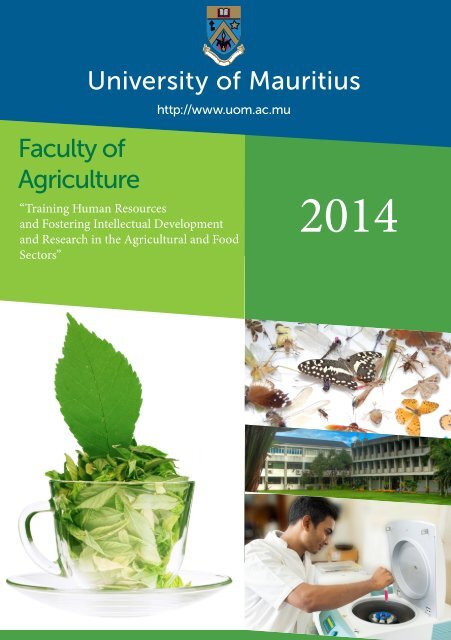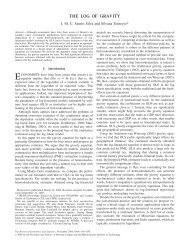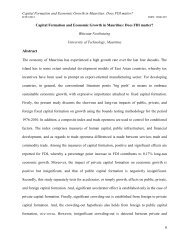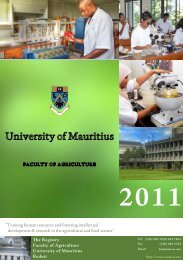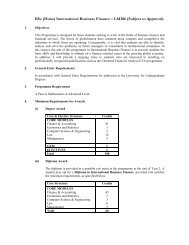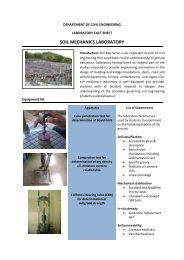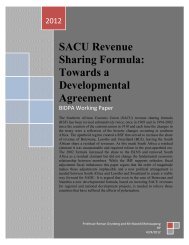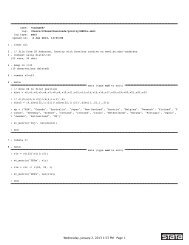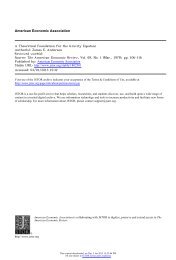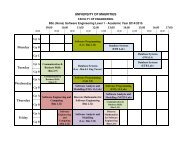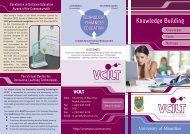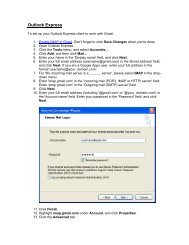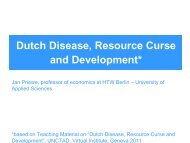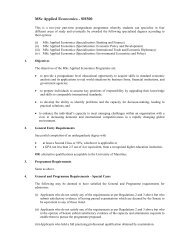to download FOA brochure (PDF) - the University of Mauritius
to download FOA brochure (PDF) - the University of Mauritius
to download FOA brochure (PDF) - the University of Mauritius
- No tags were found...
Create successful ePaper yourself
Turn your PDF publications into a flip-book with our unique Google optimized e-Paper software.
Faculty <strong>of</strong> AgricultureINTRODUCTIONThe Faculty <strong>of</strong> Agriculture, originallyfounded as <strong>the</strong> School <strong>of</strong> Agricultureunder <strong>the</strong> Department <strong>of</strong> Agriculturein 1914, plays a vital role in providingtrained human resources for <strong>the</strong> publicand private sec<strong>to</strong>rs in <strong>Mauritius</strong> as wellas in <strong>the</strong> region for <strong>the</strong> development <strong>of</strong>agriculture and related fields.It is a continuing challenge <strong>to</strong> producehigh calibre graduates <strong>to</strong> meet <strong>the</strong>changing needs <strong>of</strong> <strong>the</strong> agricultural sec<strong>to</strong>rfor this millennium. The standard andquality <strong>of</strong> our degrees are maintained<strong>to</strong> an internationally accepted levelby a system <strong>of</strong> moderation by externalexaminers from <strong>the</strong> United Kingdom,Australia and elsewhereFACILITIESThe Faculty has well equipped analyticallabora<strong>to</strong>ries certified by <strong>the</strong> Board <strong>of</strong>Agricultural Chemists <strong>of</strong> <strong>the</strong> Republic <strong>of</strong><strong>Mauritius</strong>, for teaching and research. It alsohas a fully equipped computer labora<strong>to</strong>ry. Allcomputers are connected <strong>to</strong> <strong>the</strong> <strong>University</strong>network and <strong>to</strong> <strong>the</strong> Internet giving access<strong>to</strong> electronic mail and <strong>the</strong> World WideWeb. The Faculty also has a 21-acre farm,including a nursery, a greenhouse, a cropmuseum, plant and animal labora<strong>to</strong>ries,and an animal production unit, for handsonpractical training and for student andstaff research. The Farm provides varioussupport services including <strong>the</strong> maintenance<strong>of</strong> <strong>the</strong> campus grounds.Mission Statement“Training human resources andfostering intellectual development& research in <strong>the</strong> agricultural andfood sec<strong>to</strong>rs.”The Mission <strong>of</strong> <strong>the</strong> Faculty is <strong>to</strong>provide training at undergraduateand postgraduate levels in allareas <strong>of</strong> agriculture, horticultureincluding forestry, food scienceand biotechnology, throughquality teaching, research andconsultancy services consistentwith national agricultural goalsand policies.2
OBJECTIVESᎹ Initiate, expand, diversify and upgrade training and research in priority areas <strong>of</strong>agriculture and food science so as <strong>to</strong> respond <strong>to</strong> <strong>the</strong> career aspirations <strong>of</strong> potential studentsand <strong>to</strong> <strong>the</strong> job market requirements.Ꮉ Carry out research and outreach in <strong>the</strong> exploration and modernization <strong>of</strong> agricultureand agriculture-related markets.Ꮉ Enhance links with industries andoverseas institutions for teaching, research, Structure <strong>of</strong> <strong>the</strong> Facultyconsultancy and outreach activities.Ꮉ Provide postgraduate training and research The Faculty <strong>of</strong> Agriculture consistsprogrammes for <strong>the</strong> pr<strong>of</strong>essional development <strong>of</strong> <strong>of</strong> around 100 members <strong>of</strong> staff,graduates.administrative staff, farm & campusᎹ Provide in-service training <strong>to</strong> staff <strong>of</strong> grounds unit staff, academics andinstitutions in <strong>the</strong> agricultural and agro-industrialsec<strong>to</strong>rs.technical staff grouped in<strong>to</strong> <strong>the</strong>Agricultural Production & SystemsᎹ Develop and <strong>of</strong>fer specialized shorttraining programmes in line with <strong>the</strong> evolution in Department and Agricultural &agricultural and food sec<strong>to</strong>rs.Food Science Department.DEAN OF FACULTYHead,Department <strong>of</strong>Agricultural &Food ScienceOfficerin-Charge,FarmAdministrativeOfficerHead,Department <strong>of</strong>Agricultural Production& SystemsAcademic StaffTechnical StaffFarm/CampusStaffAdministrative& SupportStaffAcademic StaffTechnical StaffACTIVITIESTeaching, Research, Consultancy and Outreach Activities are carried out in:• Agricultural Chemistry• Biotechnology• Bioinformatics• En<strong>to</strong>mology• Botany• Animal Science & Production• Crop Science & Production• Molecular Biology• Plant Tissue Culture• Agribusiness• Aquaculture• Post-Harvest Technology• Agricultural Experimentation• Food Science & Technology• O<strong>the</strong>r Agriculture and FoodScience related areas3
PROGRAMME OF STUDIES (ACADEMIC YEAR 2014/2015)ObjectivesOverviewOur Programmes <strong>of</strong> Studies promote intellectual skills (critical reasoning,understanding, problem solving), practical skills (research and methods) andpersonal skills (communication, planning and organisational abilities) <strong>to</strong> equipstudents for a career in research, extension, teaching, administration and enterprise.UndergraduateDuration1. BSc (Hons) Applied Biochemistry 3 Yrs FT2. BSc (Hons) Agricultural Science and Technology(with 6 months placement)3 1/2 Yrs FT3. BSc (Hons) Biotechnology 3 Yrs FT4. BSc (Hons) Crop Technology(Minor: Landscape Management)5. BSc (Hons) Food Science and Technology(Minor: Food Microbiology)(with 6 months placement)6. BSc (Hons) Food Science and Technology(Minor: Seafood Technology) (with 6 months placement)7. Diploma/ BSc (Hons) Agriscience and Technology (ForRodrigues)3 Yrs FT3 1/2 Yrs FT3 1/2 Yrs FT5 Yrs PTPostgraduate1. MSc Agribusiness Management(with 6 months placement)1 1/2 Yrs FT2. MSc Aquaculture & Ocean Studies 2 Yrs PT3. MSc Bioinformatics 2 Yrs PT4. MSc Tropical Animal Production 2 Yrs PTTraining Human Resourcesand Fostering IntellectualDevelopment and Researchin <strong>the</strong> Agricultural and FoodSec<strong>to</strong>rs”4
BSC (HONS) APPLIED BIOCHEMISTRYBiochemistry is central <strong>to</strong> all areas <strong>of</strong> <strong>the</strong>“biological” and “life” sciences. It aims <strong>to</strong> providean understanding <strong>of</strong> every aspect <strong>of</strong> <strong>the</strong> structureand function <strong>of</strong> living things at a molecular level.It is a practical labora<strong>to</strong>ry science that applies<strong>the</strong> molecular approaches <strong>of</strong> chemistry <strong>to</strong> <strong>the</strong>vast variety <strong>of</strong> biological systems. Biochemistryencompasses <strong>the</strong> study <strong>of</strong> <strong>the</strong> chemical changesneeded for life processes, such as providingenergy and building block molecules from ourdiet, so that we may grow, move and reproduce.It is, <strong>the</strong>refore, <strong>the</strong> most important and broadest <strong>of</strong><strong>the</strong> life sciences, spanning a wide range <strong>of</strong> areasfrom microbiology <strong>to</strong> plant and animal sciences.The impact <strong>of</strong> studies in biochemistry on modernlife is enormous. Understanding <strong>the</strong> pathology <strong>of</strong>diseases such as diabetes, cancer, heart disease,Alzheimer’s and Parkinson’s is built on research bybiochemists. This novel approach is allowing <strong>the</strong>development <strong>of</strong> innovative drugs and vaccines.Techniques such as DNA-fingerprinting haverevolutionised forensics and crime detection, whileDNA-chip technology has fuelled rapid advancesin gene research. Biotechnological applicationsin agriculture and genetically–modified crops<strong>of</strong>fer enhanced resistance <strong>to</strong> pests and improvedyields. Scientists are able <strong>to</strong> probe <strong>the</strong> structure andfunction <strong>of</strong> specific biomolecules, understand howproteins work in exquisite detail, recognize howmetabolic pathways are regulated, decipher <strong>the</strong>human genome, analyse <strong>the</strong> expression <strong>of</strong> genes,identify molecular defects in human diseasesamongst o<strong>the</strong>rs through research advances in<strong>the</strong> field <strong>of</strong> biochemistry. In addition, <strong>the</strong> rapiddevelopment <strong>of</strong> bioinformatics over <strong>the</strong> lastdecade, has brought new <strong>to</strong>ols for researchers <strong>to</strong>use in understanding <strong>the</strong> molecules <strong>of</strong> life, and inintegrating information in<strong>to</strong> networks and systems.Biochemistry has shaped <strong>the</strong> new concepts <strong>of</strong>structural biology and molecular genetics.This programme will give learners a sound and broadbackground in biochemistry. It will aim <strong>to</strong> providetraining in <strong>the</strong> <strong>the</strong>oretical and practical aspects<strong>of</strong> biochemistry and its applications. Learners willhave several opportunities <strong>to</strong> familiarise <strong>the</strong>mselveswith biochemical methodology and <strong>to</strong> samplesome <strong>of</strong> its most exciting applications. The modularstructure <strong>of</strong> <strong>the</strong> programme, with a broad base at <strong>the</strong>beginning, sample opportunities for specialisation at<strong>the</strong> end, and <strong>the</strong> pr<strong>of</strong>essional placement in <strong>the</strong> middle,will give learners both breadth and in-depth knowledge.As a versatile and knowledgeable biochemist, learnerswill have a broad choice <strong>of</strong> careers upon graduationincluding opportunities in industry particularly in <strong>the</strong>biotechnology sec<strong>to</strong>r, university, private or state-ownedlabora<strong>to</strong>ries as well as medical or veterinary schools.Upon successful completion <strong>of</strong> thisprogramme, learners will:• Gain a solid background in coreareas <strong>of</strong> Biochemistry including <strong>the</strong> structure,function, syn<strong>the</strong>sis, characterization andanalysis <strong>of</strong> biomolecules as well as acquireknowledge on recent advances in molecularbiology, molecular cell biology, computationalmodeling and bioinformatics• Apply that basic understanding <strong>to</strong> <strong>the</strong>study <strong>of</strong> specific and more advanced <strong>to</strong>pics inpure or applied life science disciplines• Be equipped with <strong>the</strong> up-<strong>to</strong>-date skillsrequired for immediate practice and ability <strong>to</strong>use <strong>the</strong>ir knowledge <strong>to</strong> <strong>the</strong> practical solutions <strong>of</strong>real existing problems• Gain an understanding <strong>of</strong> <strong>the</strong> basicmechanisms inherent <strong>to</strong> living systems• Acquire skills for labora<strong>to</strong>ry proceduresand techniques, that will enable <strong>the</strong>m <strong>to</strong> go formore specialist training later in <strong>the</strong>ir career• Gain hands-on experience in a number<strong>of</strong> <strong>the</strong> practical methods and techniques used inbiological investigations• Develop skills in <strong>the</strong> applicationand interpretation <strong>of</strong> a range <strong>of</strong> appropriateexperimental techniques.• Develop biologically and statisticallysound research skills• Develop independent learning abilities• Develop <strong>the</strong> ability <strong>to</strong> comprehend,analyse and critique published information inbiology.• Develop <strong>the</strong> ability <strong>to</strong> formulatehypo<strong>the</strong>ses and problem questions• Develop <strong>the</strong> ability <strong>to</strong> use integratedapproaches <strong>to</strong> problem solving.• Apply <strong>the</strong>ir knowledge andunderstanding in order <strong>to</strong> initiate and carry outan extended piece <strong>of</strong> work or project.5
BSC (HONS) AGRICULTURAL SCIENCE AND TECHNOLOGY(WITH 6 MONTHS PLACEMENT)and food sec<strong>to</strong>r, <strong>to</strong> become entrepreneurs,<strong>to</strong> develop and manage agribusiness, <strong>to</strong> workas research scientists. The placement aimsat equipping <strong>the</strong> graduating student with <strong>the</strong>ability <strong>to</strong>(i) develop from dependence <strong>to</strong>independence in learningThe changing socio-economic pattern <strong>of</strong><strong>Mauritius</strong> has led <strong>to</strong> an increasing demandfor agricultural produce <strong>of</strong> good quality.Agricultural production is now increasinglybeing characterised by <strong>the</strong> use <strong>of</strong> moderntechnology. It is <strong>the</strong> Government policy andvision for <strong>the</strong> future <strong>to</strong> adopt a technologybasedapproach <strong>to</strong> render <strong>the</strong> localagricultural sec<strong>to</strong>r more productive, serviceoriented,sustainable and competitive whilstresponding <strong>to</strong> <strong>the</strong> environmental and ethicalstandards demanded by society.The growth linkages in agriculture (upstream<strong>to</strong> suppliers <strong>of</strong> inputs, equipment andservices, and downstream in processing,marketing and consumption) are greaterthan in o<strong>the</strong>r sec<strong>to</strong>rs. This programmeaims at connecting science with needsand opportunities in agriculture <strong>to</strong> equipstudents with a broad spectrum <strong>of</strong> scientific,technical and managerial skills needed<strong>to</strong> contribute <strong>to</strong> <strong>the</strong> future success <strong>of</strong>agriculture in <strong>Mauritius</strong> and elsewhere.Theprogramme aims at training <strong>the</strong> students insecuring long-term food security <strong>to</strong> reduceimports and sustain <strong>the</strong> transformation <strong>of</strong>agricultural production systems.The programme <strong>of</strong>fers <strong>the</strong> opportunity <strong>of</strong> a6-month work placement with <strong>the</strong> objective<strong>of</strong> preparing graduating students with <strong>the</strong>knowledge, skills and abilities, inter alia, <strong>to</strong>interact with producers in <strong>the</strong> agricultural6(ii)think creatively(iii) develop an analytical approach <strong>to</strong>problem-solving(iv) promote interpersonal skills (teamworkand communication).By <strong>the</strong> end <strong>of</strong> this programme, graduates willhave developed knowledge, abilities and skills<strong>to</strong>:• Explain <strong>the</strong> scientific, economic, environmentaland business principles underpinningagricultural productivity and production;• Identify and evaluate appropriate agriculturaltechniques in <strong>the</strong> crop and animal sec<strong>to</strong>rs<strong>to</strong> enhance efficiency <strong>of</strong> production andsecure long-term food security;• Identify and solve technological problemsencountered in current crop and lives<strong>to</strong>ckproduction systems;• Evaluate <strong>the</strong> wider consequences <strong>of</strong>agricultural activities and promote sustainableagricultural practices;• Transfer relevant knowledge, skills andtechnology concepts <strong>to</strong> <strong>the</strong> producers and <strong>to</strong>support innovation;• Design, plan and carry out research in<strong>the</strong> various fields <strong>of</strong> agriculture;• Manage agricultural enterprises andidentify new ventures in <strong>the</strong> agricultural sec<strong>to</strong>r;• Use appropriate scientific and statisticalmethods and evaluations for decision making invarious sec<strong>to</strong>rs <strong>of</strong> agriculture;• Demonstrate use <strong>of</strong> written and oralcommunication skills;• Embark on training programmes atpostgraduate level.
BSC (HONS) BIOTECHNOLOGYUpon successful completion <strong>of</strong> thisprogramme, learners will be able <strong>to</strong>:Biotechnology originates in <strong>the</strong> 1950’s, when<strong>the</strong> secret <strong>of</strong> life, DNA was disclosed by two UKresearchers, Watson and Crick. The term is nowdescribed as a multi-disciplinary science coveringa range <strong>of</strong> disciplines including molecular biology,genetics, biochemistry, analytical chemistry andbioprocess engineering. People’s lives have beeninfluenced by biotechnology for centuries as aresult <strong>of</strong> <strong>the</strong> use <strong>of</strong> microorganisms <strong>to</strong> producefood and drinks. The production <strong>of</strong> antibiotics by<strong>the</strong> large-scale fermentation <strong>of</strong> microorganismsin <strong>the</strong> pharmaceutical industry has revolutionizedhealthcare. Biotechnological methods are nowbeing applied <strong>to</strong> provide solutions <strong>to</strong> variousproblems such as <strong>the</strong> use <strong>of</strong> novel drugs for <strong>the</strong>cure <strong>of</strong> cancer, AIDS and o<strong>the</strong>r diseases and canalso be exploited <strong>to</strong> provide environment friendlysolutions <strong>to</strong> very difficult problems such as <strong>the</strong>microbial digestion <strong>of</strong> wastes for <strong>the</strong> production<strong>of</strong> biogas. Biotechnology has also a crucial role <strong>to</strong>play with respect <strong>to</strong> food security issues through<strong>the</strong> use <strong>of</strong> cell and tissue culture technology forrapid propagation <strong>of</strong> plants and techniques <strong>of</strong>molecular diagnosis.• Demonstrate a broad understanding <strong>of</strong><strong>the</strong> concepts and applications <strong>of</strong> biotechnology;• Apply <strong>the</strong>ir knowledge <strong>of</strong> biotechnology<strong>to</strong> solve various problematic issues;• Communicate effectively <strong>the</strong>information and arguments while showingcritical analytical skills;• Use a range <strong>of</strong> techniques <strong>to</strong> initiate andundertake <strong>the</strong> analysis <strong>of</strong> data and information;• Show practical competenciesand techniques in molecular biology andbiotechnology;• Depict <strong>the</strong> uncertainty, ambiguity andlimitations <strong>of</strong> knowledge in biotechnology;• Describe and comment on particularaspects <strong>of</strong> recent trends in biotechnology;• Apply <strong>the</strong>ir knowledge andunderstanding in order <strong>to</strong> initiate and carry outan extended piece <strong>of</strong> work or project.This programme is designed <strong>to</strong> provide studentswith grounding in <strong>the</strong> various disciplines mentionedhighlighting <strong>the</strong> recent possibilities for medical,pharmaceutical and agricultural applications whileconsidering <strong>the</strong> ethical issues.7
BSC (HONS) CROP TECHNOLOGY(MINOR: LANDSCAPE MANAGEMENT)On completion <strong>of</strong> this programme, learnerswill be able <strong>to</strong>:The agricultural sec<strong>to</strong>r plays a vital role inensuring food security, generating incomeand alleviating poverty. Self-sufficiency infood production needs <strong>to</strong> be addressed soas <strong>to</strong> cater for <strong>the</strong> growing population. Inorder <strong>to</strong> overcome <strong>the</strong> uncertainties facingour agro-industry, <strong>to</strong> ensure homogeneousquality products and competitive prices, <strong>the</strong>reis need <strong>to</strong> have broad access <strong>to</strong> appropriateinnovations, as well as <strong>the</strong> knowledge andskills. Fur<strong>the</strong>rmore, <strong>the</strong> Government <strong>of</strong><strong>Mauritius</strong> is actively encouraging <strong>the</strong> use <strong>of</strong>green, efficient and innovative productiontechnology.In line with <strong>the</strong> expansion <strong>of</strong> our <strong>to</strong>urismindustry with <strong>the</strong> development <strong>of</strong> <strong>the</strong> IRS,luxury hotels, villas and golf courses estates,this industry is becoming one <strong>of</strong> <strong>the</strong> mainavenues for economic diversification.Landscape is significant <strong>to</strong> <strong>to</strong>urismdevelopment in many aspects; landscapeshave <strong>the</strong> potential <strong>to</strong> enhance mental,physical and social wellbeing, and <strong>the</strong>seattributes are overwhelmingly importantgiven <strong>the</strong> beneficial impact on <strong>the</strong> quality<strong>of</strong> life. This course <strong>the</strong>refore aims atintroducing landscape elements as effectiveways <strong>to</strong> promote sustainable <strong>to</strong>urismdevelopment as well as creating relaxed andres<strong>to</strong>rative environment with <strong>the</strong> application<strong>of</strong> efficient and innovative techniques <strong>of</strong>crop technology.• Explain <strong>the</strong> scientific, economic andbusiness principles underpinning crop productionmethods under various types <strong>of</strong> productionsystems;• Identify technological problems encounteredin current crop production systems;• Understand <strong>the</strong> principles that guidelandscape design in terms <strong>of</strong> patterns, focalpoints, balance and colours;• Set up, run and manage a business inlandscaping;• Design gardens & parks and implementsuch plans based on <strong>the</strong> aes<strong>the</strong>tic palette <strong>of</strong>plants;• Understand <strong>the</strong> need for ecology,ecosystems, <strong>the</strong> erosion <strong>of</strong> genetic diversity ingreen spaces and how this affects landscapes;• Res<strong>to</strong>re existing landscapes, whichhave been badly designed and under-managed;• Implement concepts <strong>of</strong> sustainabilityand good landscape design, management andimplementation practices in hotels and greenspaces;• Evaluate <strong>the</strong> wider consequences <strong>of</strong>agricultural activities and promote sustainableagricultural practices;• Provide an understanding <strong>of</strong> <strong>the</strong> latesttechnologies used in agriculture including farmmachinery, hydroponics, greenhouses and tissueculture techniques; and• Appreciate <strong>the</strong> importance <strong>of</strong> crop improvementin agriculture using such techniquesas plant breeding and molecular biology methods<strong>of</strong> marker assisted selection.8
BSC (HONS) FOOD SCIENCE AND TECHNOLOGY(MINOR: FOOD MICROBIOLOGY) (WITH 6 MONTHS PLACEMENT)The programme is designed <strong>to</strong> develop <strong>the</strong>necessary attitude and competence for <strong>the</strong>application <strong>of</strong> scientific principles in foodprocessing, with particular emphasis on <strong>the</strong> useand control <strong>of</strong> microorganisms, in order <strong>to</strong> respond<strong>to</strong> <strong>the</strong> need <strong>to</strong> ensure food quality and mitigate<strong>the</strong> incidence <strong>of</strong> food poisoning outbreaks in <strong>the</strong>country. It aims at preparing graduates for <strong>the</strong> foodsec<strong>to</strong>r including food industries, small and mediumfood enterprises, food authorities, food labora<strong>to</strong>riesand food research institutions. Teaching willimpart knowledge, skills and values <strong>to</strong> developemployability and produce lifelong learners whocan think and act creatively. Teaching methods willfacilitate practical, interactive, critical, reflective andintegrative learning. Teaching modes <strong>of</strong> deliverywill include modules comprising all face-<strong>to</strong>-faceactivities, and modules with a mix <strong>of</strong> face-<strong>to</strong>-faceand on-line activities through e-learning platforms.The programme <strong>of</strong>fers students <strong>the</strong> opportunity<strong>to</strong> undertake a 6-month work placement in afood organisation which has a food microbiologylabora<strong>to</strong>ry, <strong>to</strong> contextualise learning within reallifesituations. Effective teaching and learning willcontribute <strong>to</strong> national capacity building <strong>to</strong>wardsenhancing food safety, quality and security,as well as sustainable food production <strong>to</strong> fulfilconsumer, business, economic, social, ethical andenvironmental requirements.On completion <strong>of</strong> this programme, learners willbe able <strong>to</strong>:• Explain <strong>the</strong> microbiological, chemical, physical,nutritional and sensory properties <strong>of</strong> food, and<strong>the</strong> fac<strong>to</strong>rs which affect <strong>the</strong>se properties duringmanufacture and s<strong>to</strong>rage;• Describe <strong>the</strong> structure, characteristics, role andsignificance <strong>of</strong> microorganisms in foods;• Explain <strong>the</strong> importance <strong>of</strong> food safety, quality, securityand sustainable food production systems;• Apply scientific principles <strong>to</strong> control <strong>the</strong> microbiological,chemical, physical, nutritional and sensory properties <strong>of</strong>food during manufacture and s<strong>to</strong>rage;• Apply methods <strong>of</strong> preservation and sustainableprocessing technologies <strong>to</strong> control deterioration andmicrobiological spoilage in foods;• Apply effective decontamination technologies andcontrol <strong>of</strong> proliferation <strong>of</strong> foodborne pathogens <strong>to</strong>produce safe foods;• Describe key food laws and standards which impac<strong>to</strong>n food business activities and <strong>the</strong> environment, withparticular emphasis on food hygiene, process hygieneand microbiological criteria;• Apply methods <strong>of</strong> food analysis <strong>to</strong> assess quality,nutritive value, safety and compliance with legalrequirements and standards;• Carry out sampling and labora<strong>to</strong>ry procedures <strong>to</strong>isolate, enumerate, detect, identify and characterisemicroorganisms throughout <strong>the</strong> food chain, withparticular emphasis on food products and hygieneassessment <strong>of</strong> food processing plants;• Interpret microbiological data for necessary correctiveand preventive actions;• Use microbiological data and information <strong>to</strong> performfood safety risk assessment;• Participate in <strong>the</strong> development, implementation and maintenance <strong>of</strong> sustainable food safety managementsystems <strong>to</strong> protect consumer health and life;• Apply scientific principles in <strong>the</strong> use <strong>of</strong> microorganisms <strong>to</strong> develop new food ingredients and products;• Participate in <strong>the</strong> application <strong>of</strong> epidemiological methods in <strong>the</strong> investigation <strong>of</strong> food poisoning outbreaks;• Apply acquired knowledge and skills <strong>to</strong> <strong>the</strong> implementation <strong>of</strong> tasks and problem-solving in a food-relatedwork environment;• Participate in interactive communication and team-working <strong>to</strong> ensure effectiveness and efficiency <strong>of</strong>academic as well as pr<strong>of</strong>essional activities;• Apply <strong>the</strong> steps involved in a research process;• Demonstrate effective written and oral scientific communication skills;• Make a positive contribution <strong>to</strong> <strong>the</strong> successful development <strong>of</strong> small and medium food enterprises, foodindustries and catering organisations;• Engage in enhancing <strong>the</strong> effectiveness and sustainability <strong>of</strong> <strong>the</strong> national food control system;• Embark on training programmes at postgraduate level.9
BSC (HONS) FOOD SCIENCE AND TECHNOLOGY(MINOR: SEAFOOD TECHNOLOGY) (WITH 6-MONTHS PLACEMENT)The programme is designed <strong>to</strong> develop<strong>the</strong> necessary attitude and competencefor <strong>the</strong> application <strong>of</strong> scientific principles infood processing, with particular emphasison technologies relevant <strong>to</strong> <strong>the</strong> seafoodindustry, in order <strong>to</strong> respond <strong>to</strong> <strong>the</strong> currentdevelopmental needs <strong>of</strong> <strong>the</strong> country. It aimsat preparing graduates for <strong>the</strong> food sec<strong>to</strong>rincluding food industries, small and mediumfood enterprises, food authorities, foodlabora<strong>to</strong>ries and food research institutions.Teaching will impart knowledge, skills andvalues <strong>to</strong> develop employability and producelifelong learners who can think and actcreatively. Teaching methods will facilitatepractical, interactive, critical, reflective andintegrative learning. Teaching modes <strong>of</strong>delivery will include modules comprisingall face-<strong>to</strong>-face activities, and modules witha mix <strong>of</strong> face-<strong>to</strong>-face and on-line activitiesthrough e-learning platforms.The programme <strong>of</strong>fers students <strong>the</strong>opportunity <strong>to</strong> undertake a 6-month workplacement in a food organisation within <strong>the</strong>seafood sec<strong>to</strong>r, <strong>to</strong> contextualise learningwithin real-life situations. Effective teachingand learning will contribute <strong>to</strong> nationalcapacity building <strong>to</strong>wards enhancingfood safety, quality and security, as wellas sustainable food production <strong>to</strong> fulfilconsumer, business, economic, social,ethical and environmental requirements.• Explain <strong>the</strong> chemical, physical, microbiological,nutritional and sensory properties <strong>of</strong> food,and <strong>the</strong> fac<strong>to</strong>rs which affect <strong>the</strong>se propertiesduring manufacture and s<strong>to</strong>rage, with particularemphasis on seafood products;• Establish <strong>the</strong> value <strong>of</strong> seafood productsfrom nutritional, health, quality and economicperspectives;• Explain <strong>the</strong> significance <strong>of</strong> food safety, quality,security and sustainable food productionsystems, with particular relevance <strong>to</strong> seafoodproducts;• Apply scientific principles <strong>to</strong> control <strong>the</strong>chemical, physical, microbiological, nutritionaland sensory properties <strong>of</strong> food during manufactureand s<strong>to</strong>rage, with particular relevance <strong>to</strong>seafood products;• Apply methods <strong>of</strong> preservation and sustainableprocessing technologies <strong>to</strong> control spoilagemechanisms in foods and <strong>to</strong> produce safefoods, with particular emphasis on seafoodproducts;• Describe key food laws and standards whichimpact on food business activities and <strong>the</strong> environment,especially pertaining <strong>to</strong> <strong>the</strong> seafoodsec<strong>to</strong>r;• Apply methods <strong>of</strong> food analysis <strong>to</strong> assessquality, nutritive value, safety and compliancewith legal requirements and standards;• Describe <strong>the</strong> application <strong>of</strong> food hygienethroughout <strong>the</strong> food chain, from “farm/sea <strong>to</strong>table”;• Participate in <strong>the</strong> development, implementationand maintenance <strong>of</strong> sustainable foodsafety management systems <strong>to</strong> protect consumerhealth and life;• Apply acquired knowledge and skills <strong>to</strong> <strong>the</strong>implementation <strong>of</strong> tasks and problem-solving ina food-related work environment;• Participate in interactive communication andteam-working <strong>to</strong> ensure effectiveness and efficiency<strong>of</strong> academic as well as pr<strong>of</strong>essional activities;• Apply <strong>the</strong> steps involved in a research process;• Demonstrate effective written and oral scientific communication skills;• Make a positive contribution <strong>to</strong> <strong>the</strong> successful development <strong>of</strong> small and medium food enterprises,food industries and catering organisations;• Engage in enhancing <strong>the</strong> effectiveness and sustainability <strong>of</strong> <strong>the</strong> national food control system;• Embark on training programmes at postgraduate level.On completion <strong>of</strong> this programme, learnerswill be able <strong>to</strong>:10
DIPLOMA/BSC (HONS) AGRISCIENCE AND TECHNOLOGYThe changing socio-economic pattern<strong>of</strong> <strong>Mauritius</strong> and Rodrigues has led <strong>to</strong> anincreasing demand for agricultural produce<strong>of</strong> good quality. Agricultural production isnow increasingly being characterised by<strong>the</strong> use <strong>of</strong> modern technology. It is <strong>the</strong>Government policy and vision for <strong>the</strong> future<strong>to</strong> adopt a technology-based approach <strong>to</strong>render <strong>the</strong> local agricultural sec<strong>to</strong>r moreproductive, service-oriented, sustainableand competitive whilst responding <strong>to</strong><strong>the</strong> environmental and ethical standardsdemanded by society.The fur<strong>the</strong>r development <strong>of</strong> agricultureand its related industries is challenging andrequires appropriate knowledge, skills andtechnology concepts <strong>to</strong> keep pace with <strong>the</strong>latest technological developments in thatsec<strong>to</strong>r. This has led <strong>to</strong> <strong>the</strong> need for welltrainedagricultural scientists who have <strong>the</strong>technical and practical skills in addition <strong>to</strong>in-depth knowledge <strong>of</strong> <strong>the</strong> science <strong>to</strong> meet<strong>the</strong>se new challenges facing <strong>the</strong> Mauritianagriculture.This programme aims <strong>to</strong> upgradeknowledge <strong>of</strong> in-service staff <strong>of</strong> <strong>the</strong> variousagricultural institutions in <strong>Mauritius</strong> with abroad spectrum <strong>of</strong> scientific, technical andmanagerial skills needed <strong>to</strong> contribute <strong>to</strong><strong>the</strong> future success <strong>of</strong> agriculture.On completion <strong>of</strong> this programme graduateswill have developed knowledge and skills <strong>to</strong>:• Explain scientific, economic and businessprinciples, underpinning crop and animalproduction;• Demonstrate relevant practical skillsin key areas <strong>of</strong> agricultural production;• Identify technological problems encounteredin current crop and lives<strong>to</strong>ck productionsystems;• Transfer relevant knowledge, skillsand technology concepts <strong>to</strong> <strong>the</strong> producersand <strong>to</strong> support innovation;• Design, plan and carry out research in<strong>the</strong> various fields <strong>of</strong> agriculture;• Manage agricultural enterprises andidentify new ventures in <strong>the</strong> agricultural sec<strong>to</strong>r;• Support research, extension and o<strong>the</strong>rtechnical services in <strong>the</strong> agricultural sec<strong>to</strong>r.• Evaluate <strong>the</strong> wider consequences <strong>of</strong>agricultural activities and promote sustainableagricultural practices.11
MSC AGRIBUSINESS MANAGEMENT(WITH 6 MONTHS PLACEMENT)On completion <strong>of</strong> this programme, learners willbe able <strong>to</strong>:The agribusiness sec<strong>to</strong>r is undergoing pr<strong>of</strong>oundchanges and reforms and is moving <strong>to</strong>wardsa more market oriented environment wi<strong>the</strong>nvironmental pressures and changing consumertastes and expectations. This will require managerswho are able <strong>to</strong> undertake complex strategictasks and decision making in <strong>the</strong> actual globalagribusiness environment. This programme isdesigned <strong>to</strong> prepare graduates for careers typicallyin <strong>the</strong> following fields: public and private sec<strong>to</strong>rcompanies involved in upstream and downstreamagricultural industries; national and internationalnon-governmental organisations who are involvedin <strong>the</strong> development <strong>of</strong> <strong>the</strong> agri-food economy; inconsultancy organisations in both rural and urbanareas for developing countries. The programme iswell suited for entrepreneurs who wish <strong>to</strong> set up<strong>the</strong>ir own business. Teaching and Learning willimpart knowledge, skills and values <strong>to</strong> enhanceemployability and produce lifelong learners whocan think and act creatively. Teaching methodswill streng<strong>the</strong>n in-depth, reflective and integrativelearning.A major innovation in this masters programmeis <strong>the</strong> opportunity for learners <strong>to</strong> experience a6-month work placement in an agribusinessrelatedorganisation <strong>to</strong> develop communicationskills, real-life problem solving and team-workingskills and entrepreneurial skills. Students will thusgraduate with a firm foundation for <strong>the</strong> real world<strong>of</strong> work.• Develop agribusiness management skills;• Outline <strong>the</strong> economic, institutional, legal andsocial environment influencing <strong>the</strong> management <strong>of</strong> anagribusiness;• Recognise <strong>the</strong> need for optimisation <strong>of</strong> scarceresources while adapting <strong>to</strong> changing agriculturaltechnology;• Acquire practical skills in <strong>the</strong> management <strong>of</strong>agribusinesses through case studies and site visits;• Review evolving national, regional andinternational market conditions for those products andservices provided by agribusinesses;• Develop strategies in making an agribusinessan economically viable and pr<strong>of</strong>itable enterprise;• Generate innovative ideas <strong>to</strong> inspire <strong>the</strong>development and growth <strong>of</strong> small and medium agribusinesses;• Develop an understanding <strong>of</strong> <strong>the</strong> entiremarketing system for agricultural and food productsfrom household consumption back <strong>to</strong> production andagricultural inputs;• Explain <strong>the</strong> technical principles underpinningagricultural production under different productionsystems;• Identify technological problems encounteredin current agricultural production systems and suggestpotential pathways <strong>to</strong> reach <strong>the</strong> solutions;• Get an insight <strong>of</strong> <strong>the</strong> evolving technologicalandecological- based approaches <strong>to</strong> agriculturalproduction;• Apply <strong>the</strong> steps involved in a research process<strong>to</strong> any research project in <strong>the</strong> discipline area;• Develop <strong>the</strong>ir ability <strong>to</strong> integrate knowledgeacquired across functional areas and disciplines inAgricultural Management;• Prepare <strong>the</strong>ir continuing pr<strong>of</strong>essionaldevelopment plan <strong>to</strong>wards lifelong learning; and• Apply knowledge and skills <strong>to</strong> a practicalorganisational context12
MSC AQUACULTURE & OCEAN STUDIESframework. This programme aims <strong>to</strong> providegraduates with training in advanced aspects <strong>of</strong>sustainable aquaculture, in freshwater, coastaland marine ecosystems, and <strong>to</strong> give <strong>the</strong>ma good grounding in ocean studies, oceangovernance and management.The oceans, estuaries and freshwater bodieshave always played an important role inmeeting human needs for food, recreationand o<strong>the</strong>r resources. They also provide alivelihood for millions <strong>of</strong> people throughout<strong>the</strong> world. Overexploitation or incorrectutilisation has in many parts <strong>of</strong> <strong>the</strong> worldresulted in negative impacts on aquaticecosystems, leading <strong>to</strong> depletion <strong>of</strong> fishs<strong>to</strong>cks, loss <strong>of</strong> biodiversity, water pollution,etc. As a result, aquaculture is gainingimportance as a multi-disciplinary industrythat has <strong>the</strong> potential <strong>to</strong> meet humanneeds while protecting and maintainingecosystem structure and functions. Through<strong>the</strong> adoption <strong>of</strong> an integrated, holistic andecosystem-based management approach,aquaculture, mariculture and utilisation <strong>of</strong>ocean resources can be made economicallypr<strong>of</strong>itable, environmentally sustainable andsocially equitable.This programme has been devised <strong>to</strong> be inline with Government policy on developingan Ocean Economy for <strong>the</strong> Republic<strong>of</strong> <strong>Mauritius</strong>. Aquaculture, mariculture,utilisation <strong>of</strong> ocean-based resources suchas hydrocarbons, minerals and polymetallicnodules, deep ocean waters, biologicallyactive compounds from coastal andmarine plant and animal species for useas fertilisers, pesticides, pharmaceuticals,cosmetics, etc. have major potential in thiscontext. To realize this potential, <strong>the</strong> countryneeds trained manpower at various levels,scientifically-generated and reliable dataand knowledge, as well as <strong>the</strong> enablingOn completion <strong>of</strong> this programme, learnerswill be able <strong>to</strong>:• Explain <strong>the</strong> biological and ecological processes<strong>of</strong> aquatic ecosystems and <strong>the</strong> organismsliving in it, and <strong>the</strong> various processes governinglife in any type <strong>of</strong> water body.• Develop cultures <strong>of</strong> aquatic organisms(such as fish, crustaceans, echinoderms, corals,sponges, algae, etc.) in a wide range <strong>of</strong> cultureenvironments (from sea enclosures <strong>to</strong> semi-extensiveponds and high-tech recirculation systems).• Discuss <strong>the</strong> sensitivity <strong>of</strong> marine communitiesin relation <strong>to</strong> human interventions, includingoverexploitation, climate change, and habitatdestruction.• Explain <strong>the</strong> concept and practices <strong>of</strong> sustainablegovernance and ocean management,including local, regional and international regulations.• Understand earth and ocean geo-dynamics13
MSC BIOINFORMATICSOn completion <strong>of</strong> this programme, learners willbe able <strong>to</strong>:• Outline <strong>the</strong> molecular basis <strong>of</strong> gene structure,function and evolution.• Apply <strong>the</strong> essential programming skills <strong>to</strong>problems <strong>of</strong> molecular biology andbioinformatics.The field <strong>of</strong> biological sciences has experiencedunprecedented development over <strong>the</strong> last twodecades due <strong>to</strong> <strong>the</strong> applications <strong>of</strong> bioinformaticsin <strong>the</strong> understanding <strong>of</strong> living organisms. It iswhere computer science and biology come<strong>to</strong>ge<strong>the</strong>r <strong>to</strong> address basic problems. Hugeresources have been allocated <strong>to</strong> sequencing <strong>of</strong>genomes <strong>of</strong> diverse forms <strong>of</strong> life, from humans<strong>to</strong> plants, and microorganisms. Large numbers<strong>of</strong> databases have been set up <strong>to</strong> maintain <strong>the</strong>information that is in <strong>the</strong> public domain. Issuesrelevant <strong>to</strong> agriculture, human health and <strong>the</strong>environment are being addressed with <strong>to</strong>ols<strong>of</strong> bioinformatics <strong>to</strong> provide rapid and reliablesolutions <strong>to</strong> many problems. High-throughputtechnologies churn out large volumes <strong>of</strong> datafrom experimental procedures and <strong>the</strong>se canonly be analysed by appropriate programs. Thiscourse aims at providing <strong>the</strong> learner with <strong>the</strong>required know-how for developing and using<strong>to</strong>ols in bioinformatics. It integrates disciplines asvaried as biochemistry, cell biology <strong>to</strong> computerprogramming and algorithms. Above all it givesa choice in career paths as <strong>the</strong> training provided<strong>to</strong> graduates will enable <strong>the</strong>m <strong>to</strong> work in manydifferent fields such as medical research, drugdiscovery, veterinary labs, agricultural research,food safety, agricultural biotechnology andbiodiversity. Employers now require people withskills that can extract and analyse <strong>the</strong> informationfrom such sources.• Apply necessary skills <strong>to</strong> use statisticalmethods for <strong>the</strong> interpretation <strong>of</strong> experimental data.• Apply skills <strong>to</strong> extract information frompublicly available databases.• Demonstrate an understanding <strong>of</strong> <strong>the</strong>algorithms used in Bioinformatics.• Apply <strong>the</strong> skills <strong>to</strong> use relevant <strong>to</strong>ols currentlyavailable for understanding and comparing genomes,analyzing DNA/RNA sequences and protein structures• Apply <strong>the</strong> steps involved in gene identification,gene annotation and genome analysis.• Utilise <strong>the</strong> various bioinformatics <strong>to</strong>ols inresearch applications in <strong>the</strong> medical field, in veterinary,agricultural as well as in environmental science.14
MSC TROPICAL ANIMAL PRODUCTIONThe Programme is intended <strong>to</strong> develop<strong>the</strong> student’s ability <strong>to</strong> contribute <strong>to</strong>, and<strong>to</strong> make innovations for, <strong>the</strong> sustainabledevelopment and management <strong>of</strong> <strong>the</strong>lives<strong>to</strong>ck sec<strong>to</strong>r in <strong>Mauritius</strong>, and elsewherein <strong>the</strong> region.The Faculty uses a range <strong>of</strong> Teachingand Learning methods and assessment<strong>to</strong>ols <strong>to</strong> achieve <strong>the</strong> objectives definedabove. Teaching will be learner-centred <strong>to</strong>foster <strong>the</strong> development <strong>of</strong> a pr<strong>of</strong>essionalapproach <strong>to</strong> lifelong learning. Topicaldiscussions with industry members will beorganised. Assessment will be formativeand summative, and will incorporatevarious forms, including examinations andcontinuous assessment.The curriculum is outcomes-based and is designed<strong>to</strong> help <strong>the</strong> learners develop <strong>the</strong>ir skills and knowledgeso that <strong>the</strong>y will be able <strong>to</strong>:• Implement animal production systems with dueconsideration <strong>to</strong> protection <strong>of</strong> <strong>the</strong> environment, consumers’concerns for quality and safety and animalwelfare;• Identify, and provide solutions <strong>to</strong> and advice on,technological and management problems in tropicalanimal production systems;• Evaluate <strong>the</strong> local, and regional and global contex<strong>to</strong>f <strong>the</strong> animal production sec<strong>to</strong>r;• Design, plan and execute an experiment (labbased/ survey-based / informed from peer-reviewedliterature), evaluate <strong>the</strong> outcomes and draw valid conclusions;• Syn<strong>the</strong>sise innovative approaches <strong>to</strong> foster developmen<strong>to</strong>f <strong>the</strong> animal production sec<strong>to</strong>r;• Acquire a pr<strong>of</strong>essional approach <strong>to</strong> study and lifelonglearning.15
16http://www.uom.ac.mu/prospectivestudents
Stay In TouchThe RegistryFaculty <strong>of</strong> AgricultureFaculty <strong>of</strong> Agriculture<strong>University</strong> <strong>of</strong> <strong>Mauritius</strong>ReduitEmail: foa@uom.ac.muTel: (230) 403 7658/403 7659Fax: (230) 465 5743Website: http://www.uom.ac.muDesigned by CITS


